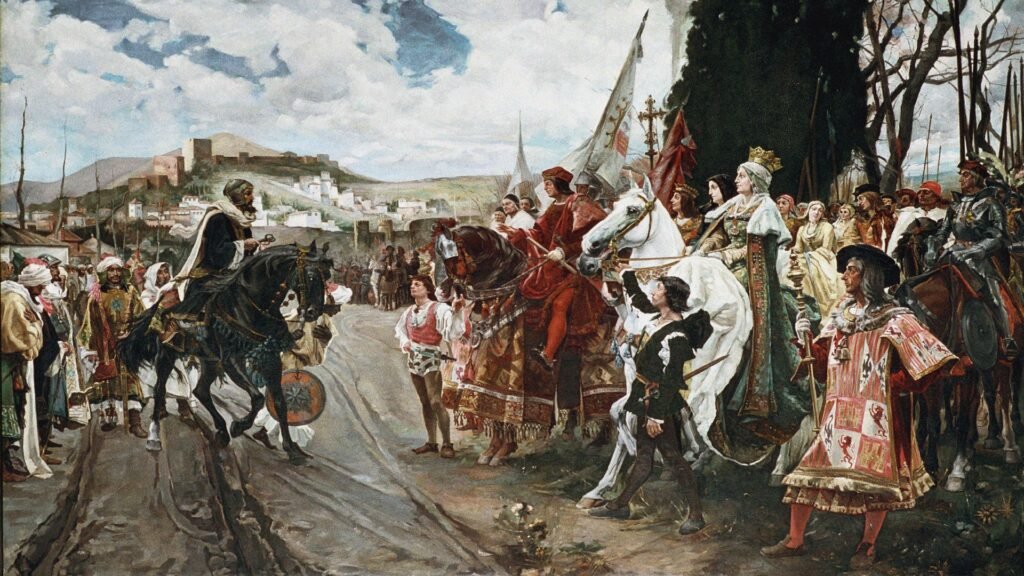7. The Moors Were Very Strict About Their Hygiene
The Moors were known for their love of cleanliness, with a popular saying claiming that a Moor “would rather go without bread than without soap.” Due to their traditions and the rigors of their religion, the Moors were fond of looking spic and span, and encouraged frequent bathing; In the Moorish town of Cordoba, there were around 900 public baths. This allowed for proper hygiene during a time when plumbing and running water were not yet widely available. Some sources also claim that the Moors brought some form of soap to Europe, introducing a new era of cleanliness.
8. The Career of Ziryab, the Famed Moorish Musician, Flourished in Spain
Ziryab, whose name meant “blackbird,” was a renowned poet, oud and lute player adored in the Islamic world. Having arrived in Spain in 822, Ziryab settled in Cordoba, where he became an instant court favorite. Ziryab was very influential, setting new fashion trends, inspiring singing and poetry, and even inventing a type of deodorant and toothpaste. Described as a major trendsetter, Ziryab was a great lover of local cuisine, having invented many new culinary recipes in Moorish Spain. Could it be that through the efforts of a single, visionary man, the whole of Europe benefited?
9. Education Was Very Important to the Moors
Education was of utmost importance to the Moors, who ensured that it was universally available to all within their realm. This stood in stark contrast to medieval Europe, where 90% of the population remained illiterate, and education was reserved for only the wealthiest nobles and clergy. In fact, there were even some European Kings who could not read or write. The Moors established 17 great universities in Spain, located in cities such as Cordoba, Malaga, Granada, Seville, Toledo and Almeria, among others.
10. Numerous Moorish Words Found Their Way into Modern Spanish and English
After their arrival in Europe, the Moors brought with them new concepts and words that quickly became a standard part of everyday language. Spanish has up to 4,000 words of Arabic origin, including algebra, checkmate, and influenza. Other examples are cipher, alcohol, chemistry, typhoon, orange, alkaline, cable and nadir.
11. At the Height of Moorish Rule, Cordoba Was the Most Modern City in Europe
During the 10th and 11th centuries, Cordoba was the very center of the Moorish world, and a great center of learning, education, and economy. The second-biggest city in Europe, Cordoba had over 80 libraries, as well as some of the most advanced knowledge of medicine, mathematics, botany and astronomy – far superior to the rest of Europe. It was also very modern for its time, having beautiful architecture, raised sidewalks for pedestrians, many miles of road and even street lighting.

12. The Moors Were Very Industrious
Upon their arrival in Iberia, the Moors saw the potential in the old Roman irrigation systems they found and quickly adopted, enhanced and revived them. This led to a surge in agricultural productivity and a boost in the economy. They were also able to cultivate new crops they brought with them such as lemons, oranges, figs, dates, and apricots. Soon, Spain became one of the largest producers of crops in Europe, all thanks to the Moors’ innovative irrigation techniques.
13. The Moors Greatly Transformed Spanish Cuisine
Spices were a rare commodity for Europeans, and their food was often considered bland. The Moors changed that by bringing over hundreds of unique spices, new recipes and innovative methods of preparing food. This culinary revolution gave rise to many wondrous dishes that we still enjoy today. The Moorish spice markets were famous for their variety, offering choice for cooks of all styles. The colors and smells of these medieval markets must have been truly incredible.
14. The Moors Had a Major Impact on the European Renaissance
Thanks to their introduction of arts, education, astronomy, mathematics and music, the Moors greatly enhanced existing European culture. Their architecture was a whirlwind of color and detail, their cuisine a typhoon of spices and flavors, their music enigmatic and exotic, their fashion sense unique and flamboyant. The Moors brought a vibrant splash of color to an otherwise gray medieval Europe. Despite being invaders, whose arrival often brought death and suffering, their greatest contribution was the infusion of artistic and cultural richness that transformed the region.
An Invasion That Brought Both Good and Bad
The Moors arrived during a tumultuous time in Iberia, which had seen many cultures come and go leaving the peninsula ravaged by war and soaked in blood. The Moors capitalized on this situation, quickly overwhelming the Visigothic Kingdom and revitalizing Spain with their colorful culture in the process of their conquest. The presence of the Moors in Europe cannot be overlooked. After all, sometimes it takes an invasion to breathe new life into a civilization and introduce beneficial aspects into a culture.
The Moors endured for several centuries in Iberia, but Spanish Christians continued to yearn their lost territory. In response they launched the Reconquista, a war which in just a few generations drove the Moors back to the sea until they were finally expelled from the Iberian Peninsula. Yet even so, the marks left behind by the Moors in Spain would never be erased.
For more on the Moors of Africa stay tuned for our next upcoming Edition of the Global African Times Magazine.
Source: Ruth De Jager, www.ancient-origins.net , www.wikipedia.com




